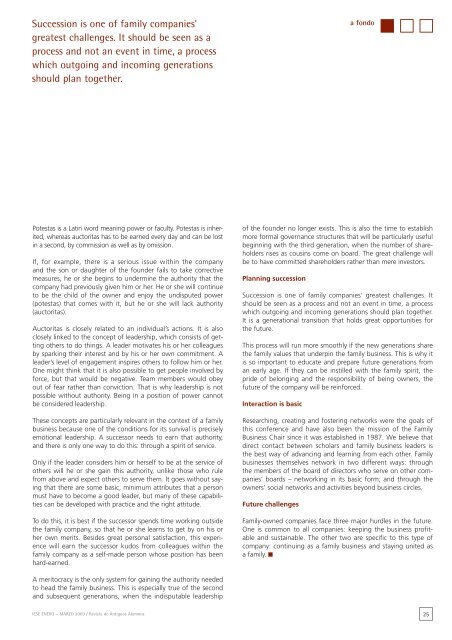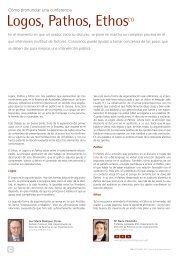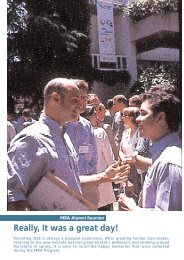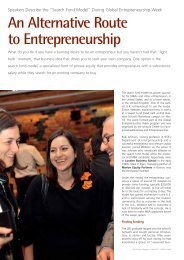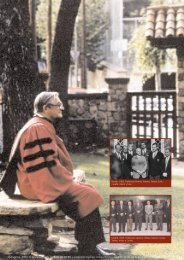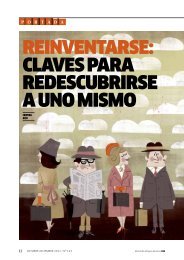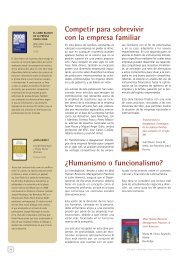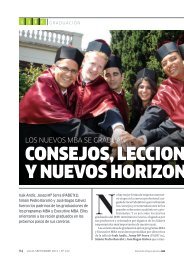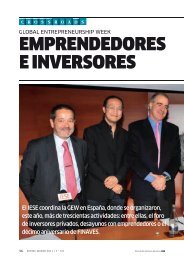Alumni Magazine - revista iese.
Alumni Magazine - revista iese.
Alumni Magazine - revista iese.
You also want an ePaper? Increase the reach of your titles
YUMPU automatically turns print PDFs into web optimized ePapers that Google loves.
Succession is one of family companies'<br />
greatest challenges. It should be seen as a<br />
process and not an event in time, a process<br />
which outgoing and incoming generations<br />
should plan together.<br />
a fondo<br />
Potestas is a Latin word meaning power or faculty. Potestas is inherited,<br />
whereas auctoritas has to be earned every day and can be lost<br />
in a second, by commission as well as by omission.<br />
If, for example, there is a serious issue within the company<br />
and the son or daughter of the founder fails to take corrective<br />
measures, he or she begins to undermine the authority that the<br />
company had previously given him or her. He or she will continue<br />
to be the child of the owner and enjoy the undisputed power<br />
(potestas) that comes with it, but he or she will lack authority<br />
(auctoritas).<br />
Auctoritas is closely related to an individual’s actions. It is also<br />
closely linked to the concept of leadership, which consists of getting<br />
others to do things. A leader motivates his or her colleagues<br />
by sparking their interest and by his or her own commitment. A<br />
leader’s level of engagement inspires others to follow him or her.<br />
One might think that it is also possible to get people involved by<br />
force, but that would be negative. Team members would obey<br />
out of fear rather than conviction. That is why leadership is not<br />
possible without authority. Being in a position of power cannot<br />
be considered leadership.<br />
These concepts are particularly relevant in the context of a family<br />
business because one of the conditions for its survival is precisely<br />
emotional leadership. A successor needs to earn that authority,<br />
and there is only one way to do this: through a spirit of service.<br />
Only if the leader considers him or herself to be at the service of<br />
others will he or she gain this authority, unlike those who rule<br />
from above and expect others to serve them. It goes without saying<br />
that there are some basic, minimum attributes that a person<br />
must have to become a good leader, but many of these capabilities<br />
can be developed with practice and the right attitude.<br />
To do this, it is best if the successor spends time working outside<br />
the family company, so that he or she learns to get by on his or<br />
her own merits. Besides great personal satisfaction, this experience<br />
will earn the successor kudos from colleagues within the<br />
family company as a self-made person whose position has been<br />
hard-earned.<br />
of the founder no longer exists. This is also the time to establish<br />
more formal governance structures that will be particularly useful<br />
beginning with the third generation, when the number of shareholders<br />
rises as cousins come on board. The great challenge will<br />
be to have committed shareholders rather than mere investors.<br />
Planning succession<br />
Succession is one of family companies’ greatest challenges. It<br />
should be seen as a process and not an event in time, a process<br />
which outgoing and incoming generations should plan together.<br />
It is a generational transition that holds great opportunities for<br />
the future.<br />
This process will run more smoothly if the new generations share<br />
the family values that underpin the family business. This is why it<br />
is so important to educate and prepare future generations from<br />
an early age. If they can be instilled with the family spirit, the<br />
pride of belonging and the responsibility of being owners, the<br />
future of the company will be reinforced.<br />
Interaction is basic<br />
Researching, creating and fostering networks were the goals of<br />
this conference and have also been the mission of the Family<br />
Business Chair since it was established in 1987. We believe that<br />
direct contact between scholars and family business leaders is<br />
the best way of advancing and learning from each other. Family<br />
businesses themselves network in two different ways: through<br />
the members of the board of directors who serve on other companies’<br />
boards – networking in its basic form; and through the<br />
owners’ social networks and activities beyond business circles.<br />
Future challenges<br />
Family-owned companies face three major hurdles in the future.<br />
One is common to all companies: keeping the business profitable<br />
and sustainable. The other two are specific to this type of<br />
company: continuing as a family business and staying united as<br />
a family.<br />
A meritocracy is the only system for gaining the authority needed<br />
to head the family business. This is especially true of the second<br />
and subsequent generations, when the indisputable leadership<br />
IESE ENERO – MARZO 2009 / Revista de Antiguos Alumnos<br />
25


